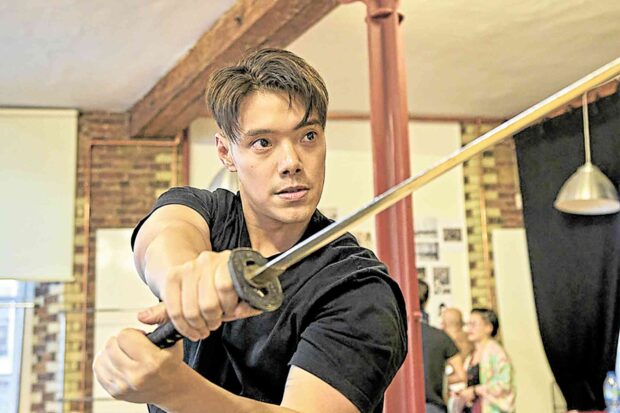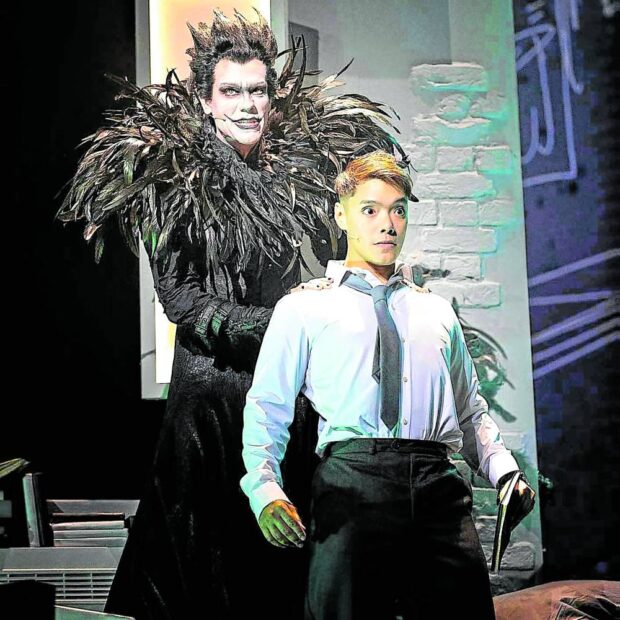From ‘Death Note’ to Sondheim: Joaquin Pedro Valdes on a roll

Joaquin Pedro Valdes rehearsing as Manjiro in Sondheim’s “Pacific Overtures” —MANUEL
HARLAN/CONTRIBUTOR
The enthusiastic hoots and groundbreaking hoopla surrounding Joaquin Pedro Valdes’ career-boosting star turn in “Death Note: The Musical” has yet to die down. From the show’s sold-out runs at The London Palladium and Lyric Theatre last August and September, Joaquin was unanimously praised by critics and theater buffs alike for his “magnificent,” “sensational,” “soaring” and “powerful” portrayal of lead character Light Yagami.
But the homegrown Filipino star is already setting his sights on yet another theater behemoth: Stephen Sondheim’s “Pacific Overtures.”
While it is one of the least performed productions in the Sondheim canon, the musical features a score considered by many as the most sophisticated and ambitious of the legendary composer-lyricist’s works.
Beginning this week, London tourists and theatergoers are in for a treat because the production’s revised 2017 version will be seen for the first time in the West End. Its previews will start at the Menier Theatre Factory tomorrow (Nov. 25) and officially opens on Dec. 4.
Helmed by Matthew White, the musical tells the story of Japan’s westernization sparked by America’s 1853 mission to forcibly open up Japan to the rest of the world.
It’s a cautionary tale as told from the perspective of two Japanese men—Kayama (Takuro Ohno), a minor samurai, and Manjiro (Joaquin), a fisherman who lived in the United States for several years after he was rescued by the Americans at sea—whose paths cross as they follow divergent ideological pursuits.
Empowering complexity
Before this, Japan had been living in peace for centuries, untouched by foreign intrusion. When the Americans arrive, however, a civilization of timeless tradition and seamless serenity begins to unravel under the impact of new ideas.
For Joaquin, there’s good reason why playing the role of Manjiro in “Pacific Overtures” is particularly significant. After all, he got rave reviews for his performance in another Sondheim musical, as Jack in “Into the Woods,” the star-studded production that we directed for New Voice 17 years ago.
But the lure of “Pacific Overtures” lies in the challenge it presented to him. Quite appropriately, Joaquin likens Sondheim musicals to the empowering complexity of a Shakespearean soliloquy.
Joaquin said over our Zoom chat last week, “Theatergoers love Sondheim for a good reason. But as an actor, performing Sondheim is like doing Shakespeare. You don’t just get to do it [easily], especially now that everything around us is overstimulating. You get a quick shot of dopamine just by scrolling through social media and the apps.

Valdes (right, as lead character Light Yagami) with Adam Pascal in “Death Note”—MARK SENIOR/
contributor
Layered, complex
“Even musically, everybody is either a TikTok or an Instagram singer. But I love how, as the teller of a Sondheim show, you’re never going to be in full control of it. You can’t just say, ‘Ah, I know this!’
“So, there’s no arrogance in it because it’s like a Shakespeare speech. There’s always something new to mine and discover. As an actor, you’re at the mercy of how layered and complex the text is—and that is why it’s never going to be the same every night because of its profundity and the universal truths it tells. And I don’t mean inaccessible—it’s just innately deep.”
Joaquin then weighed in on the joys of working with topnotch Filipino actors in our version of “Into the Woods,” staged at Music Museum in 2007.
He pointed out, “That’s also what I loved about doing ‘Into the Woods’ with such an amazing cast way back when. It was fun on a surface level but, at the same time, you’re also collectively ‘discovering’ things together as an ensemble.
“‘Into the Woods’ was easier to do because we knew the fairy tales, but then we began to appreciate the genius of how Stephen Sondheim extracts something very real from these twisted fairy tales.”
But there’s even more to dig deep and unpack in “Pacific Overtures,” Joaquin asserted: “No, I didn’t know the story of Japan opening up to the Americans before this. Given that context, it’s a story that certainly needs to be told.
“I think there are themes in the new version that were probably overlooked by the audience when it was previously staged. So what Matt White does is he brings [the show and its themes] very close to the hearts and minds of people now more than ever.
“There’s the complexity of being closed or open to new ideas. What happens when you have ideological differences with someone you love? An even bigger issue tackles colonialism and the inaccuracies of how history is being told. What happens when a nation refuses to acquiesce to global pressure? “These things are universal and very relevant these days, particularly with the war that’s going on in the Middle East. What’s nice about Matt’s handling of the material is that it isn’t trying to shove an opinion down your throat. It’s simply extracting what Sondheim and John Weidman had delicately put together. What’s more, my coactor Takuro, as Kayama, is incredible!”
Diaspora, cultural identity
Asked to discuss the development of his character, Joaquin shared, “These are real characters that are placed in real historic scenarios … but nobody really knows the accuracy of the details therein. It’s about the diaspora and cultural identity. I tend to book these roles that are initially bright-eyed and buzzy.
“At the start, Manjiro wants to bring American progress to Japan, but as the story unfolds, he falls in love with Japan as a closed country and becomes less and less American. He becomes extremely nationalistic. Kayama, on the other hand, becomes less and less Japanese and more and more Western. In the end, they end up moving in completely different directions.”
Meanwhile, the actor’s show-stopping turn in the runaway hit “Death Note”—which already had a cult following long before he won the role—prepared Joaquin to just “do his best and expect for the worst.” After all, rabid fans of the stage production condensed from a 12-volume manga already had preconceived notions about how they wanted the material to be brought to life. The actor knew it was best to “manage” his expectations.
“I try not to get affected by audience reaction because you want to go into every work with fresh energy,” he reiterated. “And even if people end up not liking a production—and I have been in some—you really don’t want to go to work knowing that people dislike it. You want to go into it with the anticipation that you can create something good, because you’re doing it eight times a week.
“But with ‘Death Note,’ it was hard not to ‘notice’ because there was so much noise. Even if you avoid it, it would be right up in your face. People and your friends would tag you, send you a message.”
Even Filipino theater icon Lea Salonga, who currently leads the cast of “Stephen Sondheim’s Old Friends” with Bernadette Peters at the Gielgud Theatre, has managed to see “Death Note.” “Yes, she watched it with [her daughter] Nic,” Joaquin told us.
“‘Death Note’ was a [staged] concert, so we only had two weeks to put the show together,” Joaquin shared. “My main takeaway from it is that we had such a great company across the board. Frank Wildhorn (‘Jekyll & Hyde,’ ‘Bonnie & Clyde’) was there since day one, followed eventually by Ivan Menchell, the writer. There was just this desire to make something good—and that became our collective focus.
‘Collective spirit’
“There’s really something special when you bring that kind of professionalism in the room. And my favorite reviews were not from the critics or the fans, but from my coactors. That felt really nice, because it’s one thing to be the leading man, but it’s another to lead a company in this ‘collective spirit’—there’s no other word for it. Everybody felt invested in wanting to do the best they could. Its ensuing success was just icing on the cake.
In the story, Light is presented with a Solomonic dilemma when he’s gifted with the power to kill any bad guy he chooses within 40 seconds. But what are Joaquin’s own thoughts on Light’s black-and-white view on morality and vigilantism?
“I love this role so much because it allows me to show the full spectrum of humanity,” he explained. “I love his complexity. He starts off as a very idealistic guy. He’s a great son, a great brother, an ideal student—people like him because he’s a good guy.
“Like me, Light believes that right is right and wrong is wrong. He doesn’t budge with that concept. But when he’s given the power to right the wrongs of the world, he gets consumed by his own pride, his obsession and self-righteousness. It’s a grand tragedy with epic themes.
“People, like detective L, are trying to stop Light or his alter ego, who is the serial killer of criminals. They want to bring back order because no vigilante, no matter how good his intentions are, deserves to take justice into his own hands.
“As a person, I’ve always had my share of darkness… it’s just a matter of choosing which one between light and dark to live by. I was struck by what one philosopher said about meekness. He said, ‘Meekness is not the absence of ferocity. Meekness is not being unable to release a monster. Meekness is knowing that you have a dragon in you, but choosing to suppress it.’”
In barely five years since he decided to take a shot at a theater career in the United Kingdom via “Miss Saigon,” Joaquin has since landed roles in “The King and I,” “Fanny & Stella,” “Heathers: The Musical,” “Vanara,” “The Lion King,” “Killing the Cat,” “Then, Now and Next,” “Death Note: The Musical” and “Pacific Overtures,” which begins its eagerly anticipated run tomorrow. How prolific can you get?